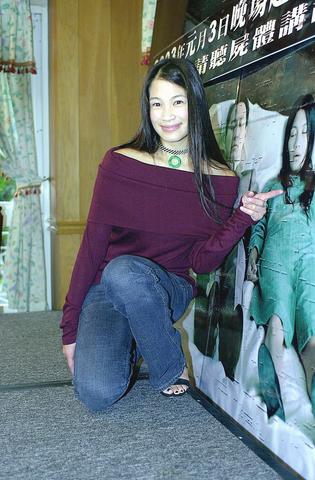The young and beautiful starlet Eugenia Yuan (
In Going Home, the third segment of Three, Yuan plays Hai-er, the dead wife of the character played by Leon Lai, who believes his wife will come back to life if he washes her body in a concoction of Chinese herbs for three years. So for 90 percent of the one-hour segment, Yuan is supposed to play dead, until the mystery unravels in the last 10 minutes and she opens her mouth to speak.
"It's not that difficult to play a dead body. The hardest part was holding my breath underwater, when I was soaked in the herbal solution in the film," Yuan who grew up in Los Angeles, said in her American-accented Mandarin. The role was Yuan's first as a lead actress. To portray a dead person under such circumstances, keeping stiff and motionless, was quite an impressive feat.

PHOTO: TAIPEI TIMES
"I have to keep my eyes open, but make them look lifeless," Yuan said. On the set director Peter Chan even had an employee watch her to make sure she did not close her eyes. "Off set, I even dreamt that I could not close my eyes anymore," Yuan said.
In addition to being underwater and keeping her eyes open, Yuan also had to appear naked, having her body washed, brushed and massaged by Leon Lai. When asked about this, Yuan said she did not feel anything at when she was touched by the Hong Kong superstar. "I just felt very very cold!" she said.
Yuan's mother is Cheng Pei-pei (
Yuan began acting in 1996, and appeared in several television series in the US, including Beverly Hills 90210, Baywatch, NYPD Blue, and Sammo Hung's Martial Law. Her newest project is Miramax's war movie The Great Raid, starring Joseph Fiennes and Benjamin Bratt.

The unexpected collapse of the recall campaigns is being viewed through many lenses, most of them skewed and self-absorbed. The international media unsurprisingly focuses on what they perceive as the message that Taiwanese voters were sending in the failure of the mass recall, especially to China, the US and to friendly Western nations. This made some sense prior to early last month. One of the main arguments used by recall campaigners for recalling Chinese Nationalist Party (KMT) lawmakers was that they were too pro-China, and by extension not to be trusted with defending the nation. Also by extension, that argument could be

Aug. 4 to Aug. 10 When Coca-Cola finally pushed its way into Taiwan’s market in 1968, it allegedly vowed to wipe out its major domestic rival Hey Song within five years. But Hey Song, which began as a manual operation in a family cow shed in 1925, had proven its resilience, surviving numerous setbacks — including the loss of autonomy and nearly all its assets due to the Japanese colonial government’s wartime economic policy. By the 1960s, Hey Song had risen to the top of Taiwan’s beverage industry. This success was driven not only by president Chang Wen-chi’s

Last week, on the heels of the recall election that turned out so badly for Taiwan, came the news that US President Donald Trump had blocked the transit of President William Lai (賴清德) through the US on his way to Latin America. A few days later the international media reported that in June a scheduled visit by Minister of National Defense Wellington Koo (顧立雄) for high level meetings was canceled by the US after China’s President Xi Jinping (習近平) asked Trump to curb US engagement with Taiwan during a June phone call. The cancellation of Lai’s transit was a gaudy

The centuries-old fiery Chinese spirit baijiu (白酒), long associated with business dinners, is being reshaped to appeal to younger generations as its makers adapt to changing times. Mostly distilled from sorghum, the clear but pungent liquor contains as much as 60 percent alcohol. It’s the usual choice for toasts of gan bei (乾杯), the Chinese expression for bottoms up, and raucous drinking games. “If you like to drink spirits and you’ve never had baijiu, it’s kind of like eating noodles but you’ve never had spaghetti,” said Jim Boyce, a Canadian writer and wine expert who founded World Baijiu Day a decade